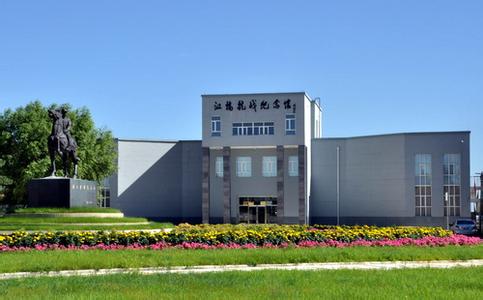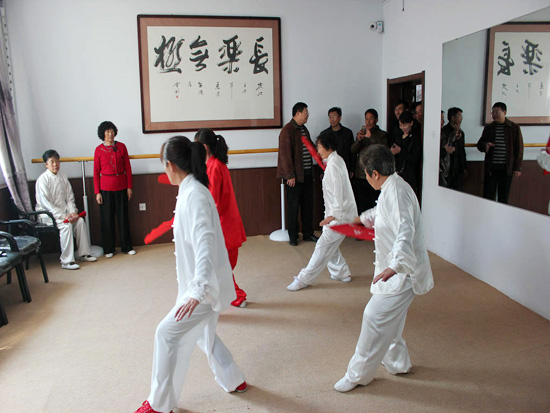 |
|
The museum of the War of Resistance Against Japanese Aggression.
|
Cultural Projects for Senior Citizens
Jiangqiao is known as the site of the earliest organized resistance against Japanese invaders in China. But today, among local people, it has a different significance as the site of a new retirement home for senior citizens.
On entering, we are greeted by well-lighted spacious rooms. On the walls hang paintings and calligraphic works created by the center’s residents. They sit in small groups, playing chess, dancing or chatting. “Here, we eat the vegetables we grow ourselves, live in well-appointed rooms, and watch the LCD TV,” said one resident surnamed Zhao. “It is our home.”
The nursing home covers 50,000 square meters of land, with a construction area of 10,860 square meters. This is the largest nursing home in Heilongjiang province and has about 1,000 residents. They include seniors from rural areas with no income or children, disabled soldiers and those with special needs due to physical disabilities.
This is not the only facility for senior citizens. In Tailai, about 85 percent of the rural elderly without income or children live in public nursing homes like this one. In the past, it was not easy for the elderly to find safe sites for exercise. Moreover, outdoor exercise had many limits – freezing cold in winter, burning hot in summer and too many rainy days. In 2011, the local government relocated several departments to clear a space of 5,165 square meters, and earmarked RMB 28 million to transform it into high-end activity centers for the elderly. In addition to the original retirement center, Tailai now has four well positioned centers that can accommodate as many as 2,000 people. Tailai County’s actions in this area have received much praise.
 |
|
When we visited the senior care home on Jinyuan Street, we heard melodious orchestral music and laughter. On an LED screen in the lobby, the weekly activity schedule, offered to men over 60 and women over 55, showed a plethora of options: music, gym, yoga, painting, Peking Opera. All classes and activities are free. All participants need to do is apply for a membership card. Teachers from the senior people’s university and coaches from cultural and sports associations are themselves elderly volunteers that provide services and manage the centers. In the last several years, elderly art troupes have taken part in various competitions in Qiqihar City or Heilongjiang province, and won awards. The four activity centers have now established management systems, service organization, learning plans and stable expense sponsors. Tailai’s trial allows the elderly in both urban and rural areas to enjoy their retirement.
By the end of my visit one question remained: With a limited budget, why did the county government allocate such a large proportion of funds to senior care? Liu Haicheng, secretary of the CPC Tailai County Committee, explained that people aged 60 and above amount to 48,000, accounting for 14.5 percent of the county’s total population. In other words, elder issues concern every family and are, therefore, a focus of livelihood projects. If the elderly don’t live well, a series of problems could come to light. But if they feel appreciated, immeasurable social benefits would accrue.
Indeed, the silver generation has become a positive force, promoting family harmony and community peace in Tailai. They are active advocates of economic development and monitors of livelihood projects. Tailai’s cultural projects have succeeded on several levels, reawakening emotions among people and achieving a big leap in senior care with modest revenue.
We Recommend:
